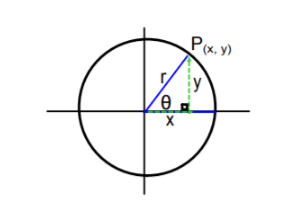Question
Question: The point \( (7,24) \) is on the terminal side of an angle in standard position, how do you determin...
The point (7,24) is on the terminal side of an angle in standard position, how do you determine the exact values of the six trigonometric functions of the angle?
Solution
Hint : In order to determine exact values of all six trigonometric function of the angle in the above question ,calculate r=x2+y2 where x will be 7 and y will be 24.And then find all the trigonometric ratios considering Hypotenuse as r ,opposite as 24 and adjacent as 7.
Formula:
Complete step-by-step answer :
Given a point P (7,24) which is on the terminal side of an angle in standard position.
Let x be 7 and y be 24

Calculating r using formula r=x2+y2
r=(7)2+(24)2 r=49+576 r=625 r=25
Hence , value of r is 25
Therefore Calculating all the trigonometric ratios as
Note : 1. Periodic Function= A function f(x) is said to be a periodic function if there exists a real number T > 0 such that f(x+T)=f(x) for all x.
If T is the smallest positive real number such that f(x+T)=f(x) for all x, then T is called the fundamental period of f(x) .
Since sin(2nπ+θ)=sinθ for all values of θ and n ∈ N.
2. Even Function – A function f(x) is said to be an even function ,if f(−x)=f(x) for all x in its domain.
Odd Function – A function f(x) is said to be an even function ,if f(−x)=−f(x) for all x in its domain.
We know that sin(−θ)=−sinθ.cos(−θ)=cosθandtan(−θ)=−tanθ
Therefore, sinθ and tanθ and their reciprocals, cosecθ and cotθ are odd functions whereas cosθ and its reciprocal secθ are even functions.
